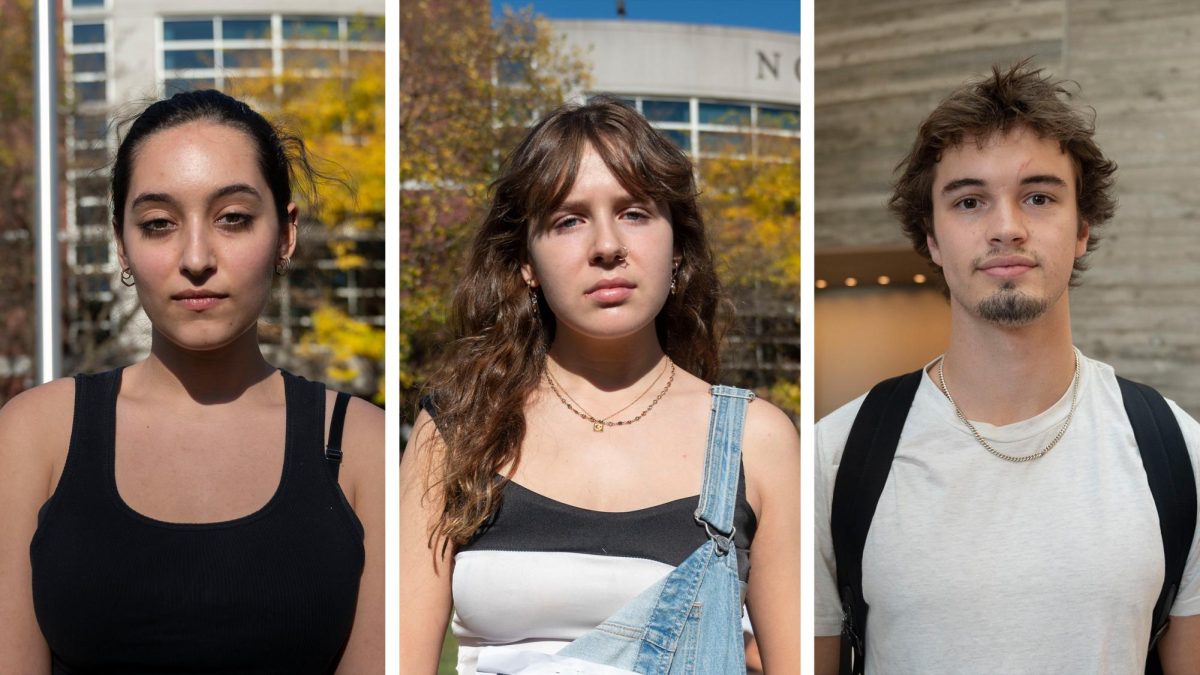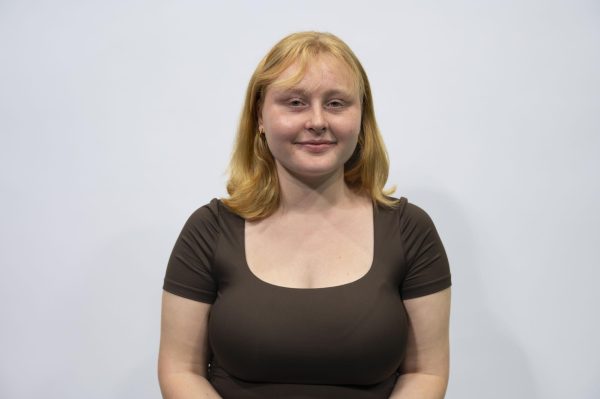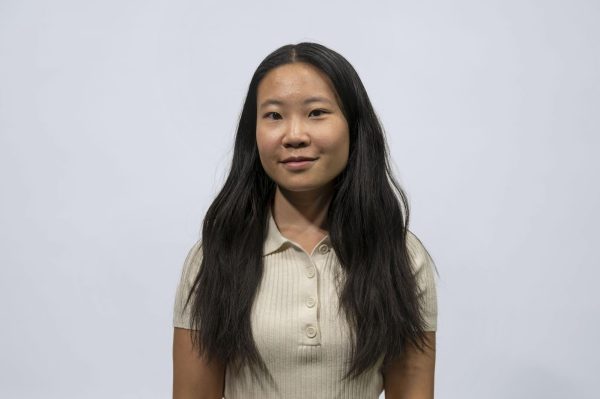The atmosphere on campus shifted early Nov. 6 as news of Donald Trump’s return to the White House reached Americans.
“I feel like sh**,” said Valentina Moghaddam, a third-year criminal justice and psychology combined major, the morning after the election. “This is pretty terrible and I genuinely don’t know how somebody who got double impeached with all of those felony counts and everything could get elected again.”
The Associated Press called the race in the early morning hours of Nov. 6 after 10 electoral college votes from the key swing state of Wisconsin pushed Donald Trump over the 270 vote threshold. This election marks the first time since 2004 that a member of the Republican party won the popular vote for president. As of Nov. 8 at 7 a.m., Trump had 73,407,735 votes while Vice President Kamala Harris had 69,074,145.
The night of the 2024 election, members of Northeastern’s community said they stayed up until the results were evident. Some woke up to texts from friends and family telling them Trump would be the next president of the United States.
“I’m shocked,” said Evan Hostetler, a second-year chemical engineering major from the key swing state of Pennsylvania. “I was not expecting Trump to also win the popular vote by such a large margin.”
A poll of the Northeastern student body conducted by The News in October estimated 85.6% of Northeastern students planned to vote for Harris. A mixture of anger, resignation, hope and ambivalence lingered on the largely-Democratic campus the next day.
Eve O’Sullivan, a first-year cell and molecular biology major from Ohio, wore a sign pinned to her overalls reading “F*** Trump and if you voted for him f*** you too” as she sat on Centennial Common the morning of Nov. 6.
“I’ve never felt more aggressive, violent or so angry in my entire life, but what I’m not going to do is grab a gun and charge the Capitol because of it,” O’Sullivan said.
Jenna Ory, a fourth-year graphic design major from New York, sat by the koi pond near Curry Student Center the morning after the election. “I guess I’m in mourning,” she said, referencing her all-black outfit.
“I’m pretty disappointed in third party voters or people who chose not to vote because this election was really crucial for women, immigrants, people of color — every type of person that this is going to affect so strongly,” Ory said. “And right now, all we needed to do was make sure Trump was not going to win.”
Northeastern’s Black Student Association, or NBSA, made a statement about Trump’s win in an Instagram post Nov. 7, saying it wanted to “remind the university of [the group’s] mission” in light of the election results and the Supreme Court’s 2023 decision to overturn affirmative action.
“Regardless of external circumstances, our purpose remains unchanged,” the statement reads. “The NBSA was founded as a political organization, and we will continue establishing a strong presence on campus and in the surrounding community, committed to the political, historical, and socio-cultural well-being of our fellow Black students and Black people as a whole.”
The statement also said students are not powerless and that civic participation “doesn’t end at voting.”
But some students, like second-year business administration major Luke McLoughlin, expressed hope for several policies Trump has proposed on the economy, a driving issue in the election.
“I don’t feel a particularly strong way about it either way. I’m just excited to see how the country will develop over the following years,” said McLoughlin, who is from Ohio. “One key issue that I want to see from Donald Trump is I want to see him bring back the purchasing power to the dollar. And I also want to see the U.S. debt get decreased.”
Though this was the first presidential election most undergraduate students could vote in, faculty provided some perspective and insight on the results.
Professor of economics and strategy James Dana said that people in a democracy tend to vote “based on their current experience with the economy and not on who they think would do a better job in the next four years.” In addition, Dana said that voters won’t hesitate to vote out incumbents, and Americans treated Harris as an incumbent.
“Voters don’t understand the economy and the link between current policies and the future. They think very short-run in terms of inflation. They think very short-run in terms of trade. Trade policies can be very bad for workers; they can also seem very good for workers,” Dana said.
“They protect U.S. industries, but the protected industry may benefit while the workers and the rest of the economy are harmed. And so you see these big boosts to a small number of people, but no one understands the cost to other workers.”
Dana said he understands why students may be concerned about issues like abortion, but he wants young people to remember that the executive branch does not wield as much power as some think.
“I certainly think that undergraduates think the president has a much bigger impact on their lives than they really do,” he said. “Massachusetts policy is not going to change and you get to choose which state you live in, and you’re all going to have jobs you’ll be able to afford. I think the direct impact on people’s lives is much smaller than they think it is.”
On his drive back from a wedding Tuesday night, while listening to the radio announcing the results, professor of political science and public policy Daniel Aldrich said he had three main concerns on his mind: international students applying for visas, a loss of funding for university programs and undocumented people in the Boston area.
He remembers the measures Northeastern took during the first Trump presidency to continue admitting international students from countries hurt by Trump ending and complicating visas to the U.S. from Muslim-majority countries Yemen, Syria, Iran, Libya and Somalia as well as Eritrea, Kyrgyzstan, Myanmar, Nigeria, Sudan and Tanzania.
“[We had] a big mess last time when visas were just canceled for no reason, not because the students had done anything wrong, but just because the government said we’re no longer giving visas from countries like Iran or countries like Nigeria or whatever and they literally cut them off,” Aldrich said. “I know that President [Aoun] has mentioned this, that we have to think through what the ramifications for our students are here.”
Aldrich is also anticipating a shift in the university’s reliance on the government, as Trump previously stated he plans to cut government funds — which includes the National Institutes of Health, National Science Foundation and National Oceanic and Atmospheric Administration — toward academic research.
“A lot of the teaching that we do in the classroom comes from our research,” Aldrich said. “This is a critical element of what we do. We may have to look now to the philanthropy field [such as] Robert Johnson Foundation, Carnegie Foundation [and] Brookings rather than relying on the government.”
Aldrich reminded students of the continued democratic agency they possess, comparing the United States’ election to the authoritarian countries of Russia and Saudi Arabia.
“We [didn’t] know here in America what was going to happen, which party was going to win,” Aldrich said. “We have to process that the reality of living in a democracy means our anxieties, our fears and our anger … [are] because we do live in a democracy.”
The Huntington News is dedicated to serving the Northeastern University community with original, professional reporting and creating an environment in which student journalists can learn from one another. Support an independent, free press at Northeastern University with your donation today.












